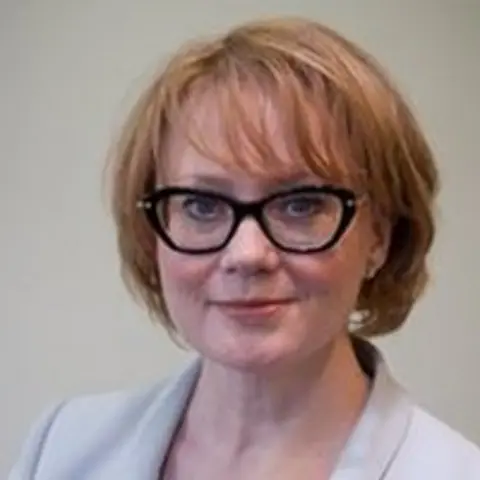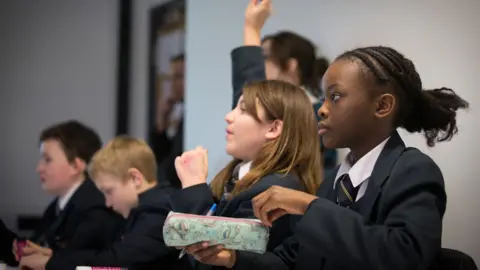'£3.8bn needed to reverse school cuts'

 Getty Images
Getty ImagesA one-off increase of £3.8bn would be needed to reverse 8% cuts in per pupil school spending, new analysis shows.
The Institute for Fiscal Studies (IFS) says a further £1.1bn would be needed each year up until 2023 to maintain spending in real terms, once rising costs were taken into account.
Candidates for the Conservative leadership have been making competing promises on education spending.
The government says funding for schools has been at its highest level ever.
School budgets have moved up the political agenda, partly as a result of campaigning by parents and head teachers across England.
IFS analysis says since 2009, spending has fallen by 8% per pupil once rising costs such as pay and pension contributions are taken into account.
"It's the largest reduction in education spending for at least 30 or 40 years or longer, so it's not surprising it has generated political pressure," says their economist Luke Sibieta.
In a new analysis published on Tuesday, the IFS says to reverse that real terms fall for 5 to 16-year-olds would take a one-off increase of £3.8bn.
That includes all spending in schools, including that by local authorities, and is more than any candidate has promised so far.
'In denial'
Jules White, the Sussex head teacher who has led the WorthLess campaign said: "There is immense frustration that this bidding war has begun, when the government has been in absolute denial about the financial constraints."
To keep up with rising pupil numbers, the IFS says £1.1bn a year would be needed to avoid future real terms cuts.
A similar 8% increase for 16 to 19-year-olds would cost around £480m as a one-off uplift.
Sixth form and further education colleges have faced the sharpest squeeze in budgets in recent years.

But with some Conservative leadership contenders also suggesting tax cuts, it's not clear where the money would be found.
Mr Sibieta says making education a priority would deepen the squeeze elsewhere, unless the government increased borrowing.
"The NHS has received a very generous settlement in advance of the spending review, but over four years other government departments are being asked to reduce spending by £2.5bn in total".
There is also a subtle rebuke for Boris Johnson from the IFS, after he described variation in funding per pupil in different parts of England as a "postcode lottery".
A new funding formula for schools is being gradually introduced, based a combination of measures of need in different local authorities.
The IFS said: "With the introduction of this formula, the government - which Mr Johnson was part of - effectively ended a long-standing postcode lottery in school funding in England."
However, many in the lowest funded areas, which include many conservative heartlands in the counties and shires, remain disappointed that the formula will not lead to substantial increases for all.
The government has argued that school spending in England is at its highest level ever in cash terms.
A statement from the Department for Education added: "We know schools face budgeting challenges, which is why we have introduced a wide range of support to help schools reduce costs and get the best value from their resources."
"The Secretary of State has made clear that as we approach the next spending review, he will back head teachers to have the resources they need to deliver a world class education in the years ahead."
